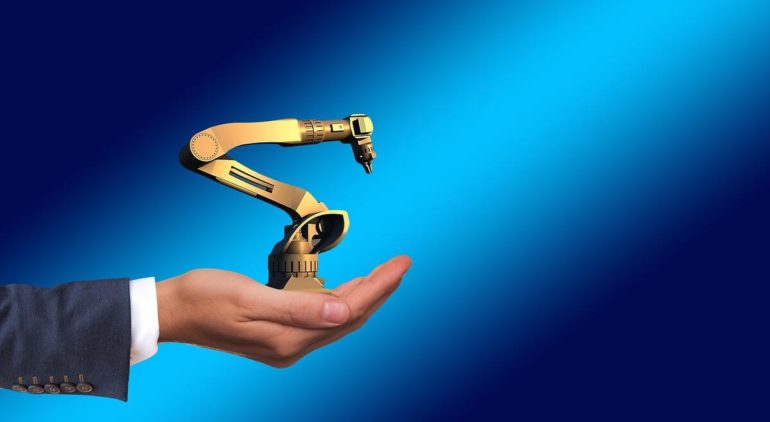There’s a new role that is becoming an integral part of many warehouses, distribution centers and factories globally: the robot expert. As labor shortages strain the manufacturing and supply chain sectors, business leaders need to realize the value of the robot expert and how they can help solve these challenges.
By upskilling individuals to manage a team of robots, mundane tasks can be left to the machines while experts handle big picture thinking and overall management of the warehouse. But where do decision makers, who often see a need but don’t have technical expertise in automation, start looking? Where are the opportunities and what’s at stake for companies that don’t adapt?
To gain insights into these and other questions about this new role and growing opportunity, I reached out to Bryan Siegal, VP, Customer Success, Vecna Robotics, as well as Mahesh Nikam, Shape Excellence System Manager, Shape Corp.
GN: How is the rise of automation catching some companies off guard or flat footed and what are some ways that you’ve seen companies arrive at the moment of adoption unprepared for the challenges ahead?
Bryan Siegal: We are hearing from most of our customers that business has now boomed to levels they have never seen before and it has pushed demands beyond the capacity of their sites. Many have gone to extended days and shifts. Finding associates to work the added shifts is a major problem to meet all their demand. These companies are caught flat footed by not having the extra capacity needed where they could otherwise have literally turned the switch and let the robots run longer. Instead, they are having to turn away revenue because they simply can’t find the resources to get it done.
The other big factor is that adopting robots takes time. Change management must be considered, including updating processes, training staff, effective reporting and management, etc. So, organizations that invest early and learn how to effectively use robots in their operations have a massive advantage over those that don’t.
GN: Can you describe what an internal Robot Expert is and various ways the role can help a company?
Bryan Siegal: The internal robot experts are associates who have been trained to interact with and operate the robot fleet at an advanced level. In this capacity, the robot expert is the on-shift expert ensuring the fleet is on mission as well as answering questions from other associates as needed and dealing with any “exceptions” as they arise.
Beyond local fleet oversight, the robot expert is the prime point of contact for our Network Operations Center (NOC) team who provide 24×7 proactive remote monitoring to ensure the fleet is running optimally. Consequently, the robot expert is key to ensure the productivity gains enabled by a fleet of robots is returned to the company.
GN: When is the right time in a company’s trajectory or growth to create a role like this?
Bryan Siegal: When a company’s growth rate, ability to find labor, or cost structure, forces them to realize they cannot keep up with competition, they often decide that autonomous equipment like our self-driving forklifts and tuggers are the solution. The team then creates a project plan for roll-out and continued operations. During that process, they appoint a team of robot experts for all shifts the fleet will be operating. The Robot Expert plays a key role in assisting with the deployment of the fleet as well as operating the fleet once fully deployed.
GN: Mahesh, I’d like to bring your experience at Shape to bear here as well. What sort of existing employees tend to make great Robot Experts and how does SHAPE CORP. support their transition to that very new role?
Mahesh Nikam: Currently, Shape is transitioning to automated material handling by developing our current team members specializing in forklift operation and utilizing their proficiency in this area to mold them into Autonomous Mobile Robot experts. We provide team members with an in-depth training on AMR safety and functionality along with hands-on training to help further develop their skill-set in this area. After team members complete their training they then receive an update on their Industrial Vehicle license for AMR. We want to ensure our team is set up for success for all development opportunities we provide at Shape.
GN: Bryan, how about from your perspective? What do the best candidates for the role have in common?
Bryan Siegal: The best candidates for the Robot Expert role exhibit several things: comfort working with industrial equipment, demonstrated skills working with software, excitement about working with cutting edge technology, and a deep understanding of the day-to-day flow in their working environments. Above all, these are folks who want to see the company grow and succeed.
These qualifications are often learned on the job, and candidates are often associates with several years of operational experience. They may also be supervisory level individuals, but all have an open mind and willingness to see new technology help transform their operations. By contrast, they do not have to be degreed engineers as we are not asking the Robot Expert to diagnose and repair robot problems. We work virtually alongside the expert and through this partnership to diagnose and resolve issues via our 24×7 NOC center. This collaboration is essentially an “on the job training” that propels their career forward as they grow and learn how to manage these types of systems. As this role becomes a mainstay, companies and industries should establish the role as a formal role and a career choice.
GN: What resources, education or professional development-focused, are available for would-be Robot Experts?
Bryan Siegal: This is an emerging role tied to the deployment of AMRs. At this early life-cycle stage across the AMR industry, training is limited to one-on-one highly personalized training with customized collateral.
That being said, there are a few specialized areas where training would be beneficial. Robots use sensors to see the world. This includes cameras, Lidars (generally a rotating laser range finder), Ultra-sonic range finders, time of flight cameras and others. Understanding how those sensors work, and common failure modes can be extremely helpful in ensuring top performance of the robots.
Another area of training is wireless networking since almost all robots depend on the wireless network for operation. Vecna Robotics’ AMRs are connected to the customer’s WiFi or cellular network. This is how we maintain communication with the AMR. Improving the robot experts’ understanding of the network needs and operational environment will make that person a valuable asset not only to us, but to the operation overall.
The third area of specialized training that can be helpful is around robot safety. Safety requirements for these systems are stringent, and if the staff doesn’t understand how the safety systems work, it can be frustrating as they ask, “why isn’t the robot moving?” Unlike manually-operated equipment, robots are mandated to have certain stand-off distances from other objects.
Information on all of these key areas can be found on Vecna Robotics’ and MassRobotics’ websites.
GN: Mahesh, as SHAPE CORP. grows and the company’s automation needs mature, and Bryan, as the same happens to Vecna and the companies it supports, how do you both expect the role of Robot Expert to change and evolve?
Mahesh Nikam: Our vision at Shape is to have our AMR Fleet servicing all production lines and keep manually operated forklifts only in areas we specify. With an expansion of AMRs we are envisioning to have a central area where AMR Experts manage the fleet with an automated order system. As we grow, this role will evolve even more by optimizing AMR routes, co-coordinating and supporting the implementation of new AMRs as well as training and onboarding new teams to assist with the management of this pivotal asset to Shape’s growth.
Bryan Siegal: Much like the training and expertise of a car mechanic has evolved along with the evolution of automobile technology, I expect the role of the Robot Expert will change as AMRs become smarter through newer sensors, faster computer processing power and more sophisticated AI algorithms. The combination of these improvements will result in AMRs being capable of performing more sophisticated jobs, working faster in teams (both human and robot teams) and allowing for greater operational throughput.
Part of the career path here will be growing from operating the robots, to learning how to effectively deploy new robots as the tools to do that become more mature and accessible to workers without advanced engineering degrees. The Robot Expert will also become part of the operational decision-making level across a site, because their knowledge of how to achieve the best outcomes using the robots will be valuable as site changes and updates are considered.



